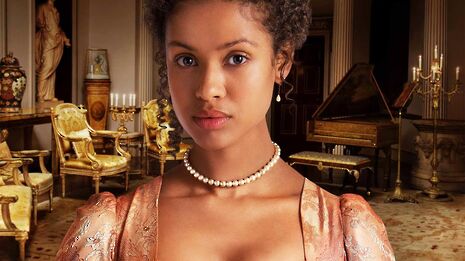Film: Belle
Rivkah Brown says Belle is a thoughful reanalysis of a period held in discriminatory gridlock

In a recent article for The Huffington Post, Misan Sagay, screenwriter of Belle, describes first seeing the painting by which the film is inspired, in which Johann Zoffany depicts Dido Elizabeth Belle alongside her cousin Elizabeth. "I encountered a stunning painting of a black girl, bright eyes looking out at me – at least that's what I saw. The caption underneath said, 'The Lady Elizabeth Murray'. That's all [...] That first encounter is to me a metaphor for why black people have to tell our own stories". Following so swiftly on the heels of Twelve Years a Slave, Sagay’s call to arms hardly seems revolutionary. Yet whereas McQueen declares full-blown war, Sagay does battle in subtler ways.
At first blush, one would be forgiven for mistaking this for Pride and Prejudice: Slavery Edition. Simply put, an Austinian costume drama riddled with monetary matchmaking is given some palatable historical context with wholly unsurprising results. Undeniably, Asante’s portrayal of slavery-era racism is tame in comparison to McQueen’s fire-breathing ferocity, seeming to acquiesce to the conventions of the form. The dialogue begins lethargically and predictably, the scenarios textbook, the rhythm plodding, the aunts suitably caricatured (though the ray of comic sunshine in the form of Penelope Wilton’s Lady Mary Murray is welcome).
Visual delight is a key ingredient of any period drama worth its salt. That said, cinematographer Ben Smithard often veers too heavily on the side of aestheticism. This goes hand-in-hand with the way the film markets itself: its being called ‘Belle’, the protagonist’s middle name, isn’t simply a subversive rejection of ‘Dido’, her Christian name and that by which she is known in polite (read: white) society. Rather, it seems strangely appropriate that the Carthaginian potency of the latter is waived in favour of the sweet inoffensiveness of the former. It is hard not to feel that Smithard’s gaze is an objectificatory one, the worthiness of Belle’s struggle brought out by her appearance. In Asante’s world, beauty, as much as suffering, is redemptive.
Yet the fault is not merely Smithard’s. Gugu Mbatha-Raw is at first decidedly more a Belle than a Dido. She frustrates with a feather-weight intonation and smiling submissiveness that refuses to ripple the surface of this beautiful drama. However, Asante has no sweet tooth, but laces her film with something that sharply undermines its seeming saccharinity. It is perhaps more than mere coincidence that Elizabeth (Sarah Gadon) is referred to by Dido as ‘Bet’, homophonically opposing ‘belle’ and ‘bête’. Equally beastly is Tom Felton, who in the viper-tongued James Ashford has refined the art of being evil. Yet the most impressive supporting performance is that of Emily Watson, whose Lady Mansfield provides a counterculturally strong-minded counterpart to her Lord Chief Justice husband (though given stalwartly by Tom Wilkinson).
On the face of it, there is a certain predictability to Belle’s narrative trajectory: one not unlike that of Elizabeth Bennett, in fact. However, Asante’s skill is in bringing class, race and gender, the three primary axes along which subalternity is engendered, to intersect in her heroine. When asked by her uncle Lord Mansfield whether she finds herself in the book she is reading, she replies: "I don’t know that I find myself anywhere". Here at last is the evidence of Sagay’s assertion that "black people have to tell our own stories". There is no blueprint – filmic, literary or even artistic – for Dido Elizabeth Belle, whose treatment at the hands of society is uniquely capable of underscoring its hypocrisies. This we begin to see when Lord Mansfield declares of his niece that he "simply will not see her diminished" by an inferior husband. Asante and Sagay present no filmic lament of the slave trade and its racist underpinnings, but a thoughtful reanalysis of a period held in discriminatory gridlock. The result is stiller than the fireworks of Twelve Years or the bombshell of Django, but all the weightier for it.
 Interviews / ‘People just walk away’: the sense of exclusion felt by foundation year students19 April 2024
Interviews / ‘People just walk away’: the sense of exclusion felt by foundation year students19 April 2024 News / Copycat don caught again19 April 2024
News / Copycat don caught again19 April 2024 News / AMES Faculty accused of ‘toxicity’ as dropout and transfer rates remain high 19 April 2024
News / AMES Faculty accused of ‘toxicity’ as dropout and transfer rates remain high 19 April 2024 Theatre / The closest Cambridge comes to a Drama degree 19 April 2024
Theatre / The closest Cambridge comes to a Drama degree 19 April 2024 News / Acting vice-chancellor paid £234,000 for nine month stint19 April 2024
News / Acting vice-chancellor paid £234,000 for nine month stint19 April 2024





